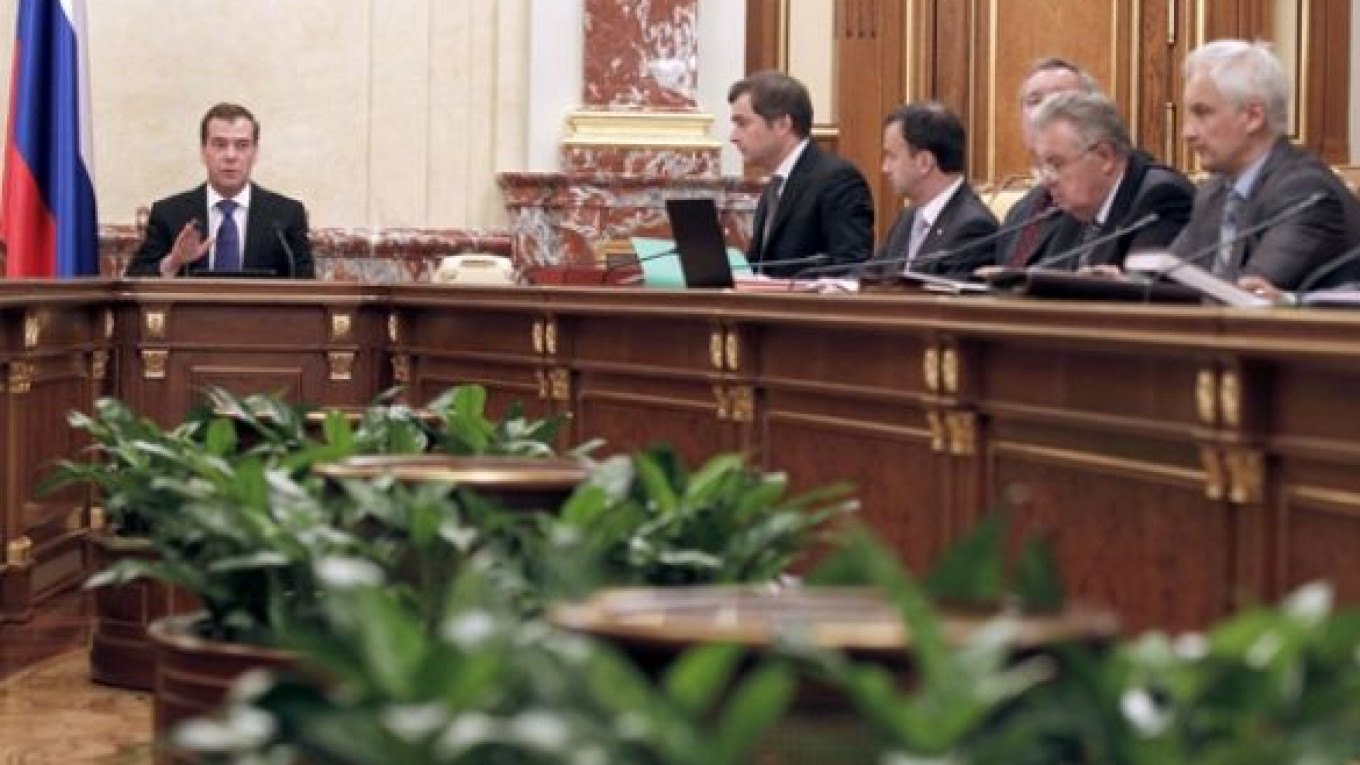Prime Minister Dmitry Medvedev on Thursday allocated responsibilities between his deputies, saying solving all the issues on his own would be too great a burden.
“I first didn’t want to [distribute the work]; I wanted to solve all the issues by myself, but then I reckoned that there’s a huge number of themes that fall under the government’s direct expertise, and I won’t manage alone,” Medvedev told his deputies at a meeting.
In an unexpected move, he put former Kremlin spin doctor Vladislav Surkov in charge of mass media — an area that analysts said has traditionally been overseen by the Kremlin.
As the government’s chief of staff, Surkov will monitor the efficiency of the executive branch, according to a statement on the government website. He will also oversee statistics and interact with the court system and prosecution agencies.
Apart from that Surkov will continue to be in charge of innovation, but he passed the social issues portfolio to Olga Golodets, who will oversee demographics, health care, education and labor, as well as youth policy and tourism.
Arkady Dvorkovich will answer to Medvedev concerning agriculture, transportation, telecommunications, environmental issues, energy and industry — excluding defense, which will remain the area of Dmitry Rogozin’s expertise.
Dmitry Kozak and Alexander Khloponin will also keep their previous responsibilities: the former will remain in charge of sports and the 2014 Winter Olympics in Sochi, construction and utilities, as well as regional policy, while the latter will continue to oversee the development of the North Caucasus.
First Deputy Prime Minister Igor Shuvalov will continue to oversee financial and economic issues, which include budget planning, investment, tax policy and Russia’s trade relations. He will also remain in charge of the government’s investment policy.
Shuvalov, who saw the range of his responsibilities expanding late last year after the ouster of former Finance Minister and Deputy Prime Minister Alexei Kudrin, will also have a few new areas of responsibility, like housing policy and the development of Moscow’s three airports.
He will also be in charge of preparations for the World Cup, which Russia will host in 2018, and the development of the Far East.
Such allocation of responsibilities was predictable but putting Surkov in charge of mass media came as a surprise, said Andrei Ryabov, an analyst at Carnegie Moscow Center.
Surkov’s responsibilities in this area remain unclear, because mass media have always been in the competence of the Kremlin’s deputy chiefs of staff, he said by telephone.
Ryabov said Surkov might stick to the economic aspects of the mass media sector, although he didn’t rule out that the role might include content regulation as well.
While in the Kremlin, Surkov, who gained the reputation of being a political mastermind, placed state television — which remains the main source of information for the majority of the population — under tight governmental control.
Medvedev also approved the structure of the Presidium — the government’s abridged decision-making body — which will now include 19 members, up from 17 in the previous Cabinet, according to a statement on the government website.
Apart from Medvedev himself, the Presidium will include all seven deputy prime ministers and 11 ministers, the statement said.
Medvedev, who chaired the first government meeting after the Cabinet was set up earlier this week, urged the Cabinet members not to place work on a shelf.
“Problems remain and undoubtedly must be solved right away,” he said, showing an immediate example of effective work during a videoconference on the problems of the domestic market for oil products that he chaired later that day.
Following a question from the Zabaikalsky region governor, he phoned the newly appointed Rosneft chairman Igor Sechin during the videoconference to ask about the possibility of establishing regional subsidiaries of the state-controlled oil company in remote regions to prevent gas price hikes.
“I’m on the air right now, I’ll call you back,” he said to end the conversation, as Sechin apparently wanted to continue the discussion.
A Message from The Moscow Times:
Dear readers,
We are facing unprecedented challenges. Russia's Prosecutor General's Office has designated The Moscow Times as an "undesirable" organization, criminalizing our work and putting our staff at risk of prosecution. This follows our earlier unjust labeling as a "foreign agent."
These actions are direct attempts to silence independent journalism in Russia. The authorities claim our work "discredits the decisions of the Russian leadership." We see things differently: we strive to provide accurate, unbiased reporting on Russia.
We, the journalists of The Moscow Times, refuse to be silenced. But to continue our work, we need your help.
Your support, no matter how small, makes a world of difference. If you can, please support us monthly starting from just $2. It's quick to set up, and every contribution makes a significant impact.
By supporting The Moscow Times, you're defending open, independent journalism in the face of repression. Thank you for standing with us.
Remind me later.






